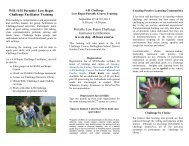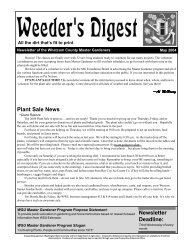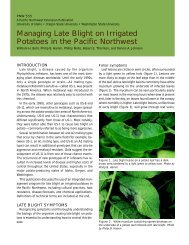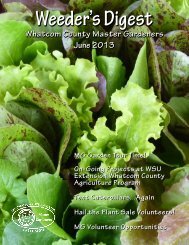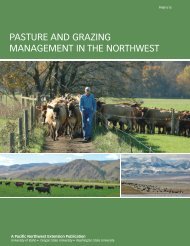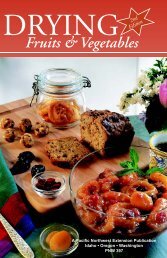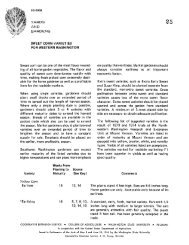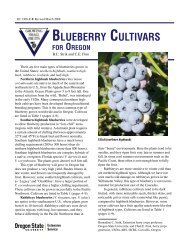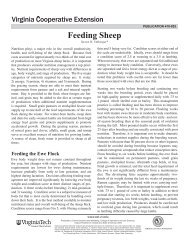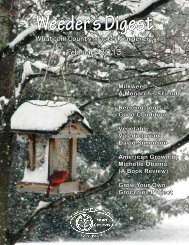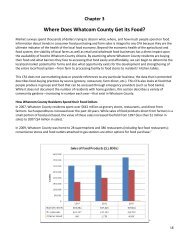August - WSU Whatcom County Extension - Washington State ...
August - WSU Whatcom County Extension - Washington State ...
August - WSU Whatcom County Extension - Washington State ...
You also want an ePaper? Increase the reach of your titles
YUMPU automatically turns print PDFs into web optimized ePapers that Google loves.
<strong>August</strong> 2005<br />
Youth and Gardening<br />
~Craig MacConnell<br />
The latest issue of HortTechnology (July – September<br />
2005, V. 15, n 3) contains a special section on Youth in Horticulture<br />
with eleven scientific papers presented on the topic. Three<br />
of the papers give results from the utilization of the Junior<br />
Master Gardener program originally developed by Texas A& M<br />
University and now a national 4-H program that is replicated in<br />
twenty eight Land Grant universities.<br />
The Junior Master Gardener program engages children in<br />
novel, “hands-on” group and individual learning experiences<br />
that promote a love of gardening, develop an appreciation for<br />
the environment, and cultivate the mind. JMG encourages youths to be of service to others through<br />
service learning and leadership development projects and rewards them with certification.<br />
The Junior Master Gardener curricula are divided into two age/grade ranges. JMG Level One is<br />
developed for grades 3 - 5, where children taking part can get involved in exploring their world<br />
through meaningful activities that strengthen academic achievement, encourage leadership development,<br />
personal pride and responsibility, and community involvement. Youths involved in the program develop critical thinking<br />
skills, and the ability to identify community concerns and take action to address them through individual group projects. JMG<br />
Level Two is designed for grades 6 – 8 and includes the “Operation Thistle – Seeds of Despair” module where middle school and<br />
junior-high youths investigate Plant Growth & Development while engaging them in an urgent mission to defeat the evil Dr. Thistle.<br />
Students will work as a group to complete lessons in each of the 8 learning concepts, then work independently to complete activities<br />
found within the mission briefs & mission option pages. By completing these missions, students help foil the twisted plans of<br />
Thistle and his menacing gang while reinforcing concepts learned in the group setting. Shades of Harry Potter.<br />
In addition to the grade based curricula, the Junior Master Gardener program has also developed stand alone, theme based<br />
curricula, called the Golden Ray Series, such as Health and Nutrition from the Garden and Wildlife Gardener in conjunction with the<br />
National Wildlife Federation.<br />
Leanna Smith and Carl Motsenbocker, with Louisiana <strong>State</strong> University report in their study of three East Baton Rouge Parish<br />
elementary schools using the first four chapters of JMG Level One Handbook that changes in pre and post science achievement<br />
scores were statistically better for the group that participated in the JMG curricula as compared to a control group. The authors<br />
state “…the results show once weekly use of gardening activities and hands-on classroom activities help improve science achievement<br />
test scores.”<br />
Amy Dirks and Kathryn Orvis, with Purdue University, Indiana, report in their study of eleven schools in ten counties in<br />
Indiana that student pre and post tests indicated overall significant gains in science, horticulture, and environmental knowledge<br />
and attitudes as a result of receiving training using the Junior Master Gardener curriculum. According to Dirks and Orvis, teachers<br />
indicated that they were satisfied with the program in their classrooms and planned to continue with the JMG for future classes.<br />
Poston, Shoemaker, and Dzewaltowski, all with Kansas <strong>State</strong> University, report student changes as a result of two after school<br />
programs with the Boys and Girls Club, Professor Popcorn, a nutrition education program developed<br />
by Purdue, and the Junior Master Gardener program. The authors found that neither program improved<br />
nutrition knowledge nor fruit and vegetable preferences or consumption. The authors did<br />
indicate that there was potential for bias in selection of the student participants.<br />
A team of members of the 2005 <strong>Whatcom</strong> <strong>County</strong> Master Gardener class did pilot the Junior<br />
Master Gardener program material this year. Soon we will have our own qualitative data on JMG<br />
program and its impact on <strong>Whatcom</strong> <strong>County</strong> youth.<br />
For more information on the Junior Master Gardener program see http://www.jmgkids.us/ or<br />
Google for a large number of state JMG websites.<br />
Office:<br />
Master Gardener<br />
1000 N. Forest St., Suite 201<br />
Bellingham, WA 98225<br />
360/676-6736<br />
Weeder’s Digest is the monthly newsletter for the <strong>Whatcom</strong> <strong>County</strong> Master Gardener Program. Guest articles are encouraged. Please submit<br />
typewritten articles by the third Wednesday of each month to Karri at the Master Gardener Office. Articles can also be submitted by e-mail to:<br />
karrimac@coopext.cahe.wsu.edu. Editor uses MS Word for Windows and PageMaker 6.5. Any articles prepared on other programs or platforms<br />
should be saved as Text Files or Rich Text Files. Editor reserves the right to edit for space considerations, grammar, spelling and syntax.<br />
Craig MacConnell<br />
Horticulture Agent



